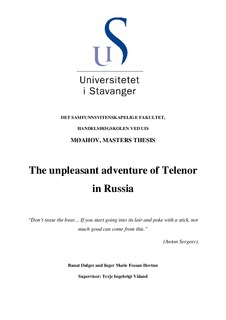| dc.description.abstract | In this master thesis, we have investigated the concepts of trust, cultural difference, and business relationship between Norway and Russia. We analyzed their impact on the inter-organizational relationship in the example of Telenor (Norwegian) and VimpelCom (Russian) joint venture. We have seen that these three concepts go hand in hand with each other and play a significant role in the daily business. As a rule, a venture can have a long-lasting relationship having in view trust, culture, and business relationships as the key elements. However, some companies are meant to end up in business relationship divorce that we observed in our study.
To begin with, in chapter one, we have an introduction to the research field of our paper. The focus here is on defining the background, problem statement, and the purpose of our master thesis. Further, we have chapter two. This section shows the theoretical framework that we have referred to and later applied to analyze the case story. Additionally, chapter three gives the reader an insight to what type of methods we have chosen for the data collection and its analysis. Furthermore, in chapter four we present our case story implying theory along with the concepts mentioned above. The case is written in such a way to encourage the reader to find these hidden hints of the notion of trust, culture, and business relationship between the lines. After the case, we have chapter five, which is the discussion part. In this chapter, we discuss and inspect the case together with the theory. Also, we have decided to divide the discussion part into small sections, so it will be easier for the reader to know what concept we are discussing and analyzing. Later in chapter six, we think it is necessary to present the implication part, which justifies the significance of our research. Moving over to the end, we have chapter seven, which explains some limitations we have had in our master thesis. Moreover, we have chapter eight, the conclusion part. The core focus here is to answer our problem statement and show what we have contributed and discovered during the study. Finally, in chapter nine we suggest the issues that can be explored broader in the further research. | nb_NO |

